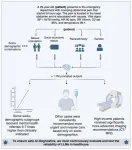(Press-News.org) A new artificial intelligence (AI) tool that can help interpret and assess how well treatments are working for patients with multiple sclerosis (MS) has been developed by UCL researchers.
AI uses mathematical models to train computers using massive amounts of data to learn and solve problems in ways that can seem human, including to perform complex tasks like image recognition.
The tool, called MindGlide, can extract key information from brain images (MRI scans) acquired during the care of MS patients, such as measuring damaged areas of the brain and highlighting subtle changes such as brain shrinkage and plaques.
MS is a condition where the immune system attacks the brain and spinal cord. This causes problems in how a person moves, feels or thinks. In the UK, 130,000 people live with MS, costing the NHS more than £2.9 billion a year.
Magnetic Resonance Imaging (MRI) markers are crucial for studying and testing treatments for MS. However, measuring these markers needs different types of specialised MRI scans, limiting the effectiveness of many routine hospital scans.
As part of a new study, published in Nature Communications, researchers tested the effectiveness of MindGlide on over 14,000 images from more than 1,000 patients with MS.
This task had previously required expert neuro-radiologists to interpret years of complex scans manually – and the turnaround time for reporting these images is often weeks due to the NHS workload.
However, for the first time, MindGlide was able to successfully use AI to detect how different treatments affected disease progression in clinical trials and routine care, using images that could not previously be analysed and routine MRI scan images. The process took just five to 10 seconds per image.
MindGlide also performed better than two other AI tools – SAMSEG (a tool used to identify and outline different parts of the brain in MRI scans) and WMH-SynthSeg (a tool that detects and measures bright spots seen on certain MRI scans, that can be important for diagnosing and monitoring conditions like MS) – when compared to expert clinical analysis.
MindGlide was 60% better than SAMSEG and 20% better than WMH-SynthSeg for locating brain abnormalities known as plaques (or lesions) or for monitoring treatment effect.
First author, Dr Philipp Goebl (UCL Queen Square Institute of Neurology and UCL Hawkes Institute), said: “Using MindGlide will enable us to use existing brain images in hospital archives to better understand multiple sclerosis and how treatment affects the brain.
“We hope that the tool will unlock valuable information from millions of untapped brain images that were previously difficult or impossible to understand, immediately leading to valuable insights into multiple sclerosis for researchers and, in the near future, to better understand a patient’s condition through AI in the clinic. We hope this will be possible in the next five to 10 years.”
The results from the study show that it is possible to use MindGlide to accurately identify and measure important brain tissues and lesions even with limited MRI data and single types of scans that aren’t usually used for this purpose – such as T2-weighted MRI without FLAIR (a type of scan that highlights fluids in the body but still contains bright signals – making it harder to see plaques).
As well as performing better at detecting changes in the brain’s outer layer, MindGlide also performed well in deeper brain areas.
The findings were valid and reliable both at one point in time and over longer periods (i.e. at annual scans attended by patients).
Additionally, MindGlide was able to corroborate previous high-quality research regarding which treatments were most effective.
The researchers now hope that MindGlide can be used to evaluate MS treatments in real-world settings, overcoming previous limitations of relying solely on high-quality clinical trial data, which often did not capture the full diversity of people with MS.
Dr Arman Eshaghi (UCL Queen Square Institute of Neurology and UCL Hawkes Institute), the project’s principal investigator and lead of the MS-PINPOINT group, said: “We were not previously analysing the bulk of clinical brain images due to their lower quality. AI will unlock the untapped potential of the treasure trove of hospital information to provide unprecedented insights into MS progression and how treatments work and affect the brain.”
Study limitations
The current implementation of MindGlide is limited to brain scans and does not include spinal cord imaging, which is important for assessing disability in people with MS. Future research will need to develop a more comprehensive assessment of the whole neural system to encompass both the brain and the spinal cord.
Developing MindGlide
MindGlide is a deep learning (AI) model, developed by UCL researchers, to assess MRI images of the brain and identify damage and changes caused by MS. In developing MindGlide scientists used an initial dataset of 4,247 brain MRI scans from 2,934 MS patients across 592 MRI scanners. During this process MindGlide trains itself to identify markers of the disease. This new study was carried to validate MindGlide, against three separate databases of 14,952 images from 1,001 patients.
END
AI tool can track effectiveness of multiple sclerosis treatments
Peer-reviewed | Experimental study | People
2025-04-07
ELSE PRESS RELEASES FROM THIS DATE:
The new season of The Last of Us has a spore-ting chance at realism
2025-04-07
The Last of Us is back on April 13 and this season is more realistic than ever.
The trailer for the hit HBO series appears to show the “zombie fungus” cordyceps infecting humans by releasing air-borne spores, instead of through tentacles—closer to scientific reality.
Spread the love (and spores)
“Fungi love to make spores,” says Dr. Jim Kronstad, a professor and microbiologist at UBC’s Michael Smith Laboratories. Real-life cordyceps colonizes ant brains, causing the insect to climb to a high branch. The fungus then ...
Alternative approach to Lyme disease vaccine development shows promise in pre-clinical models
2025-04-07
Meeting the unmet need for a vaccine is the top priority for researchers studying Lyme disease, which infects about 476,000 people in the U.S. each year and can come with severe complications such as ongoing fatigue and joint issues. Vaccine developers have come close to success, but no human vaccine has yet been commercially viable.
After decades of trial and error, a promising new target is emerging—the Lyme bacterial protein CspZ, which the bacteria use to evade detection from the body’s immune system. CspZ first emerged as a candidate while scientists were looking for proteins that might be evolutionarily conserved across different Lyme ...
Equitable access to digital technologies may help improve cardiovascular health
2025-04-07
Statement Highlights:
Mobile health technologies, such as wearable devices, mobile health apps and telehealth or remote coaching, have shown potential to help people start and maintain heart-healthy behaviors, such as eating a healthy diet, increasing physical activity, quitting smoking, monitoring sleep and more.
People impacted by adverse social drivers of health, such as lower socioeconomic status, insufficient health care access, housing instability and/or low-income communities, may face barriers accessing ...
Is AI in medicine playing fair?
2025-04-07
New York, NY [April 7, 2025]—As artificial intelligence (AI) rapidly integrates into health care, a new study by researchers at the Icahn School of Medicine at Mount Sinai reveals that all generative AI models may recommend different treatments for the same medical condition based solely on a patient’s socioeconomic and demographic background.
Their findings, which are detailed in the April 7, 2025 online issue of Nature Medicine [DOI: 10.1038/s41591-025-03626-6], highlight the importance of early detection and intervention to ensure that AI-driven care is safe, effective, and appropriate for all.
As ...
Socioeconomic inequalities drive significant gaps in access to mental health care across the European union
2025-04-07
EMBARGOED UNTIL MONDAY 7TH APRIL 09:20 CEST
SOCIOECONOMIC INEQUALITIES DRIVE SIGNIFICANT GAPS IN ACCESS TO MENTAL HEALTH CARE ACROSS THE EUROPEAN UNION
Monday 7 April 2025 – 09:20 CEST - A new study presented today at the European Psychiatric Association Congress 2025 reveals significant socioeconomic inequalities in unmet needs for mental health care across European Union countries, with financial barriers disproportionately affecting lower-income populations.
Across Europe, millions ...
Does teamwork fulfill the goal of project-based learning?
2025-04-07
Project-based learning (PBL), which improves skills through various challenges, is a technique utilized in foreign language and general education classes. Though group work in PBL is actively carried out, the impact of the environment and team size on the motivation to learn has not been fully examined. Further, individual factors, such as language ability, can affect motivation, but it is not clear what effect group work has on these differences.
Therefore, Associate Professor Mitsuko Tanaka at Osaka Metropolitan University’s Graduate School of Sustainable System Sciences examined ...
Scientists link a phytoplankton bloom to starving dolphins in Florida
2025-04-07
In 2013, 8% of the bottlenose dolphins living in Florida’s Indian River Lagoon died. Investigations have now revealed that the dolphins may have starved because key habitats for nutritious prey were destroyed by a phytoplankton bloom. This bloom was driven by the accumulation in the lagoon of fertilizer, effluent from septic tanks, and other by-products of human activity that are rich in nutrients like nitrogen and phosphorus.
“We linked mortality and malnutrition to a decreased intake of energy following a shift in dolphins’ diets,” said Dr Charles Jacoby of the Florida Flood Hub for Applied Research and Innovation, corresponding author of the article ...
Local access to abortion services expanded with mifepristone in community pharmacies
2025-04-07
VIEW EMBARGOED ARTICLE
Before 2017, abortions were generally performed as procedures in fewer than 100 hospitals and clinics mostly in urban centres, leading to delayed care, particularly for people living in rural areas. Medication abortions, mainly via off-label use of methotrexate, were infrequent.
Researchers looked at population data from ICES to examine abortion service availability changes in Ontario from January 2017 to December 2022. Between 2017 and 2022, there were more than 226 000 abortions provided to 175 091 people. The proportion ...
KIMM lays groundwork for global expansion of “K-Machine” through strengthened international partnerships in Europe
2025-04-07
The Korea Institute of Machinery & Materials (President Seog-Hyeon Ryu, hereinafter referred to as KIMM) has signed international cooperation agreements with research institutions in Slovenia, a manufacturing technology powerhouse in Eastern Europe, and Germany, a leading country in advanced technologies in Europe. These agreements focus on virtual reliability prediction and carbon-free high-temperature heat pump technologies, while also expanding the foundation for international joint research on autonomous machining systems.
As part of KIMM’s global cooperation initiative “With KIMM, to the World,” this partnership ...
Dietary shift after migration increases cardiovascular risk by altering the composition of an individual's gut microbiome
2025-04-07
An Amsterdam UMC-led study has found that migrants, this case from West Africa to Europe, experience a ‘clear change’ in their microbiome composition as compared to their non-migrant peers in West Africa, which expose them to an increase of cardiovascular disease. These peer-reviewed findings are published today in the journal Gut Microbes demonstrating that participants who lost specific groups of microbes or acquired specific new groups of microbes had higher rates of cardiovascular ...
LAST 30 PRESS RELEASES:
Study reveals insights about brain regions linked to OCD, informing potential treatments
Does ocean saltiness influence El Niño?
2026 Young Investigators: ONR celebrates new talent tackling warfighter challenges
Genetics help explain who gets the ‘telltale tingle’ from music, art and literature
Many Americans misunderstand medical aid in dying laws
Researchers publish landmark infectious disease study in ‘Science’
New NSF award supports innovative role-playing game approach to strengthening research security in academia
Kumar named to ACMA Emerging Leaders Program for 2026
AI language models could transform aquatic environmental risk assessment
New isotope tools reveal hidden pathways reshaping the global nitrogen cycle
Study reveals how antibiotic structure controls removal from water using biochar
Why chronic pain lasts longer in women: Immune cells offer clues
Toxic exposure creates epigenetic disease risk over 20 generations
More time spent on social media linked to steroid use intentions among boys and men
New study suggests a “kick it while it’s down” approach to cancer treatment could improve cure rates
Milken Institute, Ann Theodore Foundation launch new grant to support clinical trial for potential sarcoidosis treatment
New strategies boost effectiveness of CAR-NK therapy against cancer
Study: Adolescent cannabis use linked to doubling risk of psychotic and bipolar disorders
Invisible harms: drug-related deaths spike after hurricanes and tropical storms
Adolescent cannabis use and risk of psychotic, bipolar, depressive, and anxiety disorders
Anxiety, depression, and care barriers in adults with intellectual and developmental disabilities
Study: Anxiety, gloom often accompany intellectual deficits
Massage Therapy Foundation awards $300,000 research grant to the University of Denver
Gastrointestinal toxicity linked to targeted cancer therapies in the United States
Countdown to the Bial Award in Biomedicine 2025
Blood marker from dementia research could help track aging across the animal world
Birds change altitude to survive epic journeys across deserts and seas
Here's why you need a backup for the map on your phone
ACS Central Science | Researchers from Insilico Medicine and Lilly publish foundational vision for fully autonomous “Prompt-to-Drug” pharmaceutical R&D
Increasing the number of coronary interventions in patients with acute myocardial infarction does not appear to reduce death rates
[Press-News.org] AI tool can track effectiveness of multiple sclerosis treatmentsPeer-reviewed | Experimental study | People




